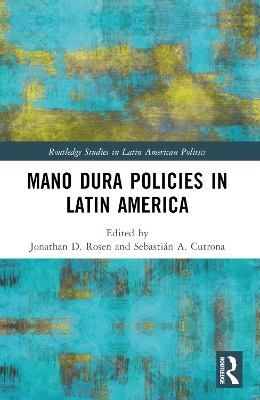
Mano Dura Policies in Latin America
Routledge (Verlag)
978-1-032-50429-2 (ISBN)
- Lieferbar (Termin unbekannt)
- Versandkostenfrei
- Auch auf Rechnung
- Artikel merken
Beginning with a discussion on the concept of mano dura, the editors move to survey various theoretical approaches to punitivism, and later review of the empirical research evaluating different drivers behind the adoption of tough on crime policies. Since hard-line initiatives often have consequences beyond the general goal of reducing violence, they then analyze the impacts of these policing strategies on crime rates and different democratic institutions. Country chapters on Mexico, El Salvador, Honduras, Guatemala, Colombia, Ecuador, Bolivia, Brazil, and Argentina follow a common thematic structure to answer the following questions:
What are some of the trends in gangs, organized crime, and violence?
How have governments responded to combat crime and violence?
What factors have fuelled the implementation of mano dura policies?
Why are mano dura policies popular?
What have the consequences of these policies been?
Mano Dura Policies in Latin America is essential reading to students of Latin American studies, political science, public policy, and criminal justice. It will also interest scholars working on drug trafficking, organized crime, and violence in Latin America.
Jonathan D. Rosen is Assistant Professor in the Professional Security Studies Department at New Jersey City University. Dr. Rosen’s research focuses on drug trafficking, organized crime, and security. He is the author of 20 books and has published journal articles in Trends in Organized Crime, the Journal of Criminal Justice, Deviant Behavior, International Journal of Offender Therapy and Comparative Criminology, and Contexto Internacional, Revista CS, among other journals. Dr. Rosen has participated in grant-funded research studies in El Salvador, Guatemala, Honduras, Nicaragua, Colombia, and Mexico. Sebastian A. Cutrona is Associate Professor at O.P Jindal Global University, India. His work has been published in Trends in Organize Crime, the International Journal of Comparative and Applied Criminal Justice, and Crime, Law, and Social Change, among others. Dr. Cutrona has taught drug trafficking, organized crime, and Latin American politics at the University of Miami (United States), Universidad de San Andrés (Argentina), and Universidad Nacional de La Rioja (Argentina). His research interests mainly consist in organized crime, drug policy, and Latin American politics.
Introduction 1. General Trends 2. The Cycle of Mano Dura Policies: The Militarization of the Drug War in Mexico 3. Performing Punitivism: Mano Dura in El Salvador 4. Mano Dura Policies in Honduras: Capitalizing off (In)Security 5. Fighting the Last War: Colombia’s Experience with "Tough on Crime" Policies 6. The Evolution of Crime Policy and Attitudes Toward Mano Dura in Ecuador 7. Throwing Away the Key: Mano Dura with Bolivian Characteristics 8. Faces of a Perverse State: Mano Dura Policies in Brazil from a Historical Perspective 9. The Popularity and Limits of Tough on Crime Policies in Argentina 10. Conclusión
| Erscheinungsdatum | 23.08.2024 |
|---|---|
| Reihe/Serie | Routledge Studies in Latin American Politics |
| Zusatzinfo | 12 Tables, black and white; 19 Line drawings, black and white; 19 Illustrations, black and white |
| Verlagsort | London |
| Sprache | englisch |
| Maße | 152 x 229 mm |
| Themenwelt | Recht / Steuern ► Strafrecht ► Kriminologie |
| Sozialwissenschaften ► Ethnologie | |
| Sozialwissenschaften ► Politik / Verwaltung | |
| Sozialwissenschaften ► Soziologie | |
| ISBN-10 | 1-032-50429-3 / 1032504293 |
| ISBN-13 | 978-1-032-50429-2 / 9781032504292 |
| Zustand | Neuware |
| Haben Sie eine Frage zum Produkt? |
aus dem Bereich


